BUS707 Applied Business Research: Ethics in Auditing Review
VerifiedAdded on 2023/06/09
|9
|1638
|480
Literature Review
AI Summary
This literature review explores the significance of ethics in accounting and auditing, focusing on ethical rules within the auditing profession. It summarizes four academic articles from 2010 onwards, examining the progression of ethical auditing, common themes such as transparency, accountability, integrity, and the importance of ethical conduct for trust and independence. Different themes include varied approaches to ethical auditing and the critical role of public trust. The review also addresses managerial implications, emphasizing the importance of ethical principles for internal auditors and the need for strong corporate governance. Finally, it identifies study limitations and proposes future research directions, including exploring the impact of risk management processes and cultural factors. Desklib provides access to this and other solved assignments to aid students in their studies.
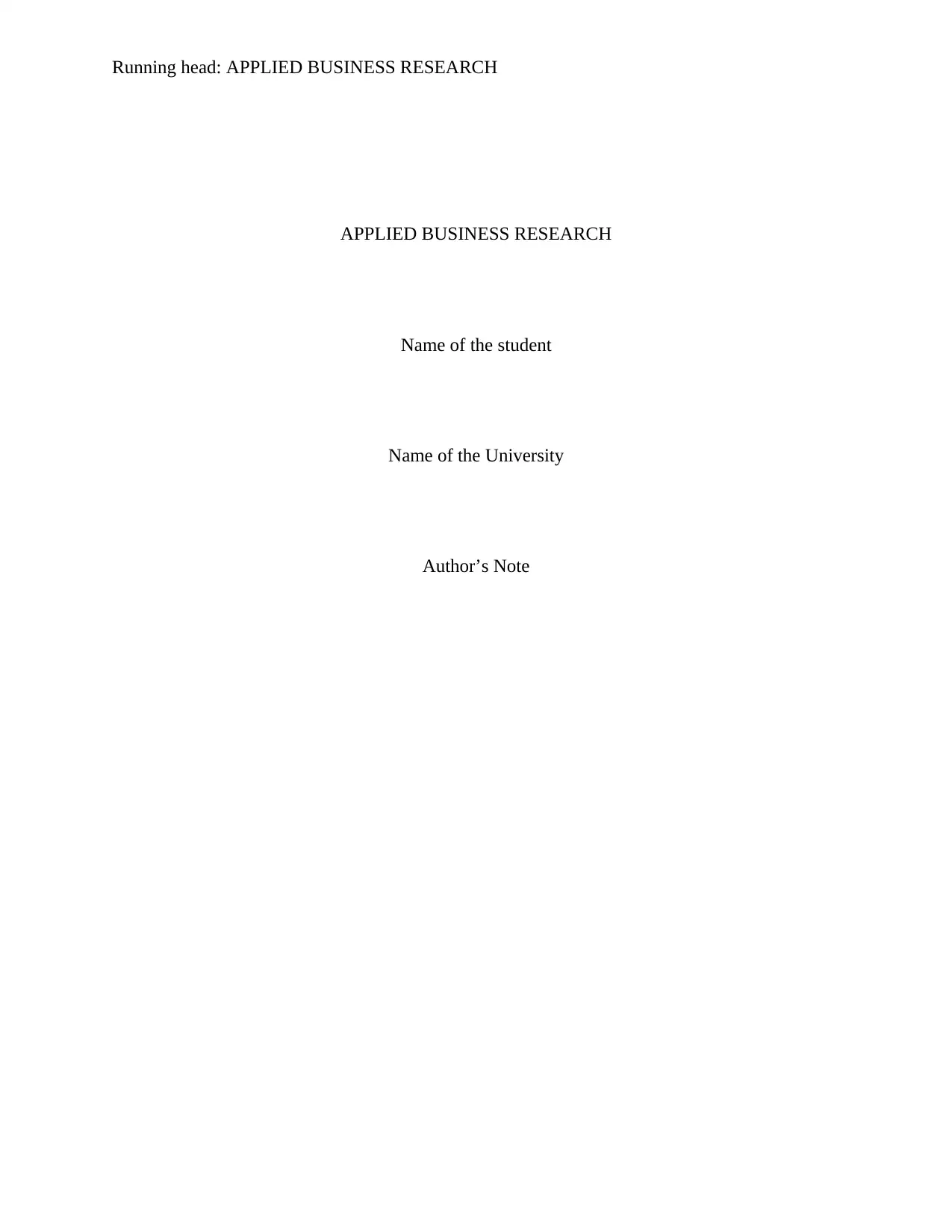
Running head: APPLIED BUSINESS RESEARCH
APPLIED BUSINESS RESEARCH
Name of the student
Name of the University
Author’s Note
APPLIED BUSINESS RESEARCH
Name of the student
Name of the University
Author’s Note
Paraphrase This Document
Need a fresh take? Get an instant paraphrase of this document with our AI Paraphraser
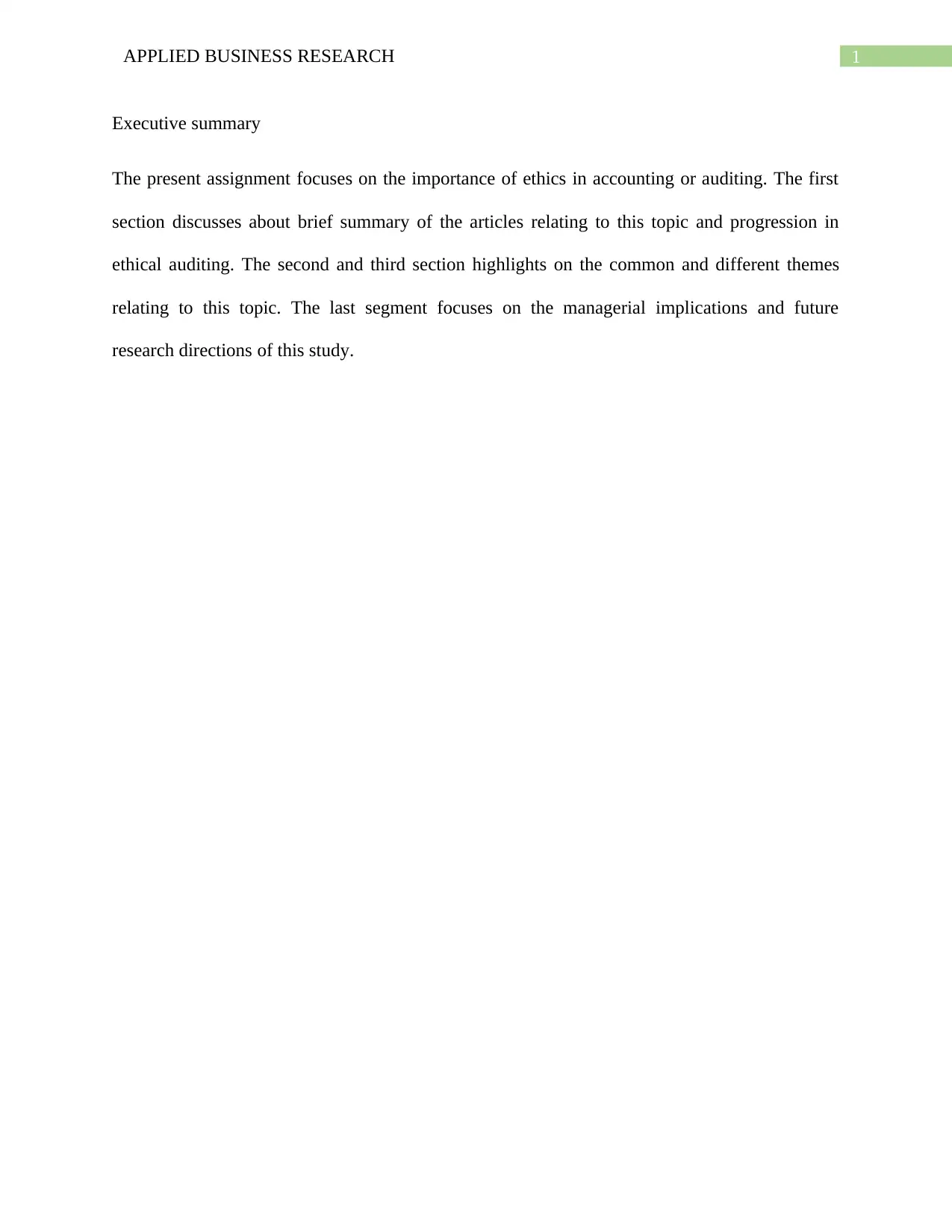
1APPLIED BUSINESS RESEARCH
Executive summary
The present assignment focuses on the importance of ethics in accounting or auditing. The first
section discusses about brief summary of the articles relating to this topic and progression in
ethical auditing. The second and third section highlights on the common and different themes
relating to this topic. The last segment focuses on the managerial implications and future
research directions of this study.
Executive summary
The present assignment focuses on the importance of ethics in accounting or auditing. The first
section discusses about brief summary of the articles relating to this topic and progression in
ethical auditing. The second and third section highlights on the common and different themes
relating to this topic. The last segment focuses on the managerial implications and future
research directions of this study.
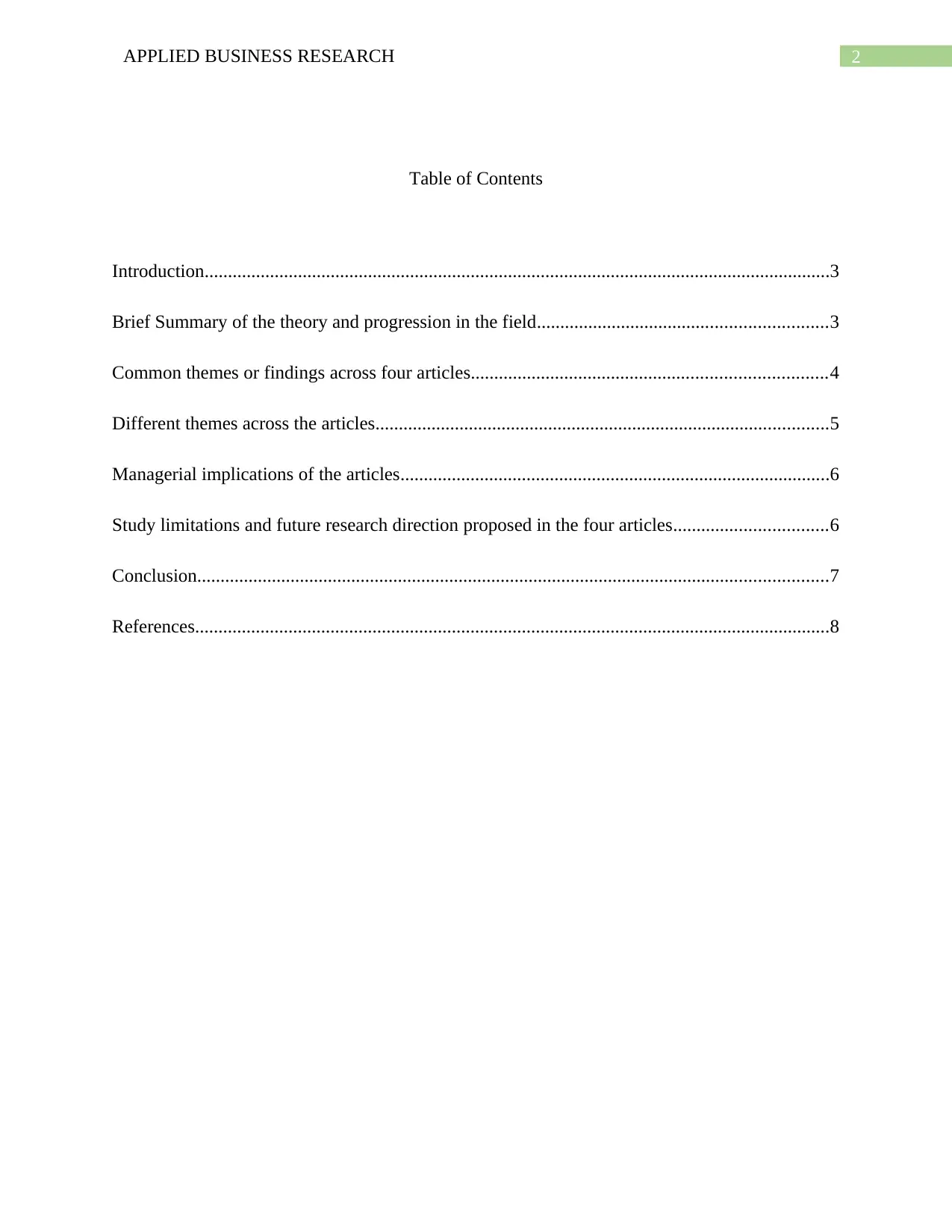
2APPLIED BUSINESS RESEARCH
Table of Contents
Introduction......................................................................................................................................3
Brief Summary of the theory and progression in the field..............................................................3
Common themes or findings across four articles............................................................................4
Different themes across the articles.................................................................................................5
Managerial implications of the articles............................................................................................6
Study limitations and future research direction proposed in the four articles.................................6
Conclusion.......................................................................................................................................7
References........................................................................................................................................8
Table of Contents
Introduction......................................................................................................................................3
Brief Summary of the theory and progression in the field..............................................................3
Common themes or findings across four articles............................................................................4
Different themes across the articles.................................................................................................5
Managerial implications of the articles............................................................................................6
Study limitations and future research direction proposed in the four articles.................................6
Conclusion.......................................................................................................................................7
References........................................................................................................................................8
⊘ This is a preview!⊘
Do you want full access?
Subscribe today to unlock all pages.

Trusted by 1+ million students worldwide
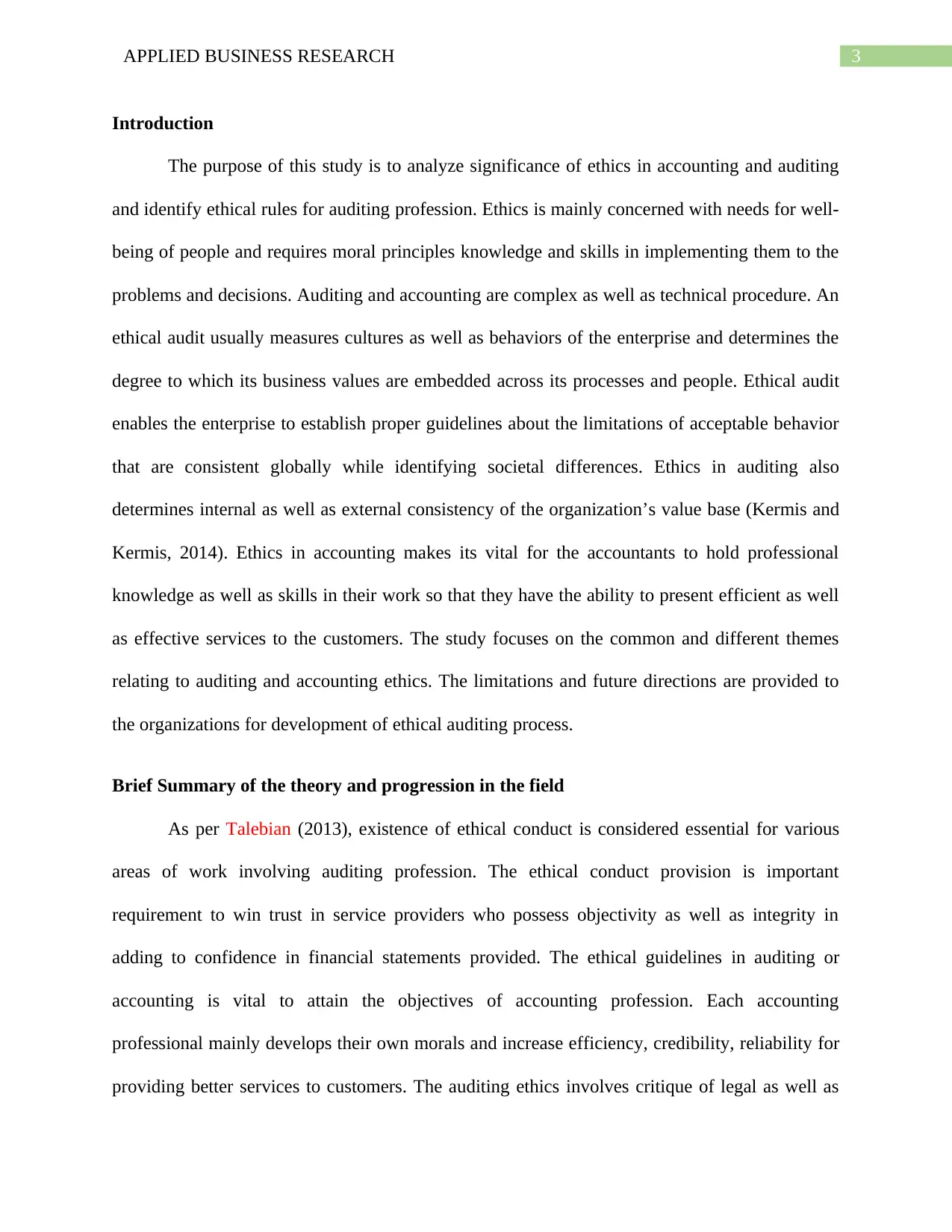
3APPLIED BUSINESS RESEARCH
Introduction
The purpose of this study is to analyze significance of ethics in accounting and auditing
and identify ethical rules for auditing profession. Ethics is mainly concerned with needs for well-
being of people and requires moral principles knowledge and skills in implementing them to the
problems and decisions. Auditing and accounting are complex as well as technical procedure. An
ethical audit usually measures cultures as well as behaviors of the enterprise and determines the
degree to which its business values are embedded across its processes and people. Ethical audit
enables the enterprise to establish proper guidelines about the limitations of acceptable behavior
that are consistent globally while identifying societal differences. Ethics in auditing also
determines internal as well as external consistency of the organization’s value base (Kermis and
Kermis, 2014). Ethics in accounting makes its vital for the accountants to hold professional
knowledge as well as skills in their work so that they have the ability to present efficient as well
as effective services to the customers. The study focuses on the common and different themes
relating to auditing and accounting ethics. The limitations and future directions are provided to
the organizations for development of ethical auditing process.
Brief Summary of the theory and progression in the field
As per Talebian (2013), existence of ethical conduct is considered essential for various
areas of work involving auditing profession. The ethical conduct provision is important
requirement to win trust in service providers who possess objectivity as well as integrity in
adding to confidence in financial statements provided. The ethical guidelines in auditing or
accounting is vital to attain the objectives of accounting profession. Each accounting
professional mainly develops their own morals and increase efficiency, credibility, reliability for
providing better services to customers. The auditing ethics involves critique of legal as well as
Introduction
The purpose of this study is to analyze significance of ethics in accounting and auditing
and identify ethical rules for auditing profession. Ethics is mainly concerned with needs for well-
being of people and requires moral principles knowledge and skills in implementing them to the
problems and decisions. Auditing and accounting are complex as well as technical procedure. An
ethical audit usually measures cultures as well as behaviors of the enterprise and determines the
degree to which its business values are embedded across its processes and people. Ethical audit
enables the enterprise to establish proper guidelines about the limitations of acceptable behavior
that are consistent globally while identifying societal differences. Ethics in auditing also
determines internal as well as external consistency of the organization’s value base (Kermis and
Kermis, 2014). Ethics in accounting makes its vital for the accountants to hold professional
knowledge as well as skills in their work so that they have the ability to present efficient as well
as effective services to the customers. The study focuses on the common and different themes
relating to auditing and accounting ethics. The limitations and future directions are provided to
the organizations for development of ethical auditing process.
Brief Summary of the theory and progression in the field
As per Talebian (2013), existence of ethical conduct is considered essential for various
areas of work involving auditing profession. The ethical conduct provision is important
requirement to win trust in service providers who possess objectivity as well as integrity in
adding to confidence in financial statements provided. The ethical guidelines in auditing or
accounting is vital to attain the objectives of accounting profession. Each accounting
professional mainly develops their own morals and increase efficiency, credibility, reliability for
providing better services to customers. The auditing ethics involves critique of legal as well as
Paraphrase This Document
Need a fresh take? Get an instant paraphrase of this document with our AI Paraphraser
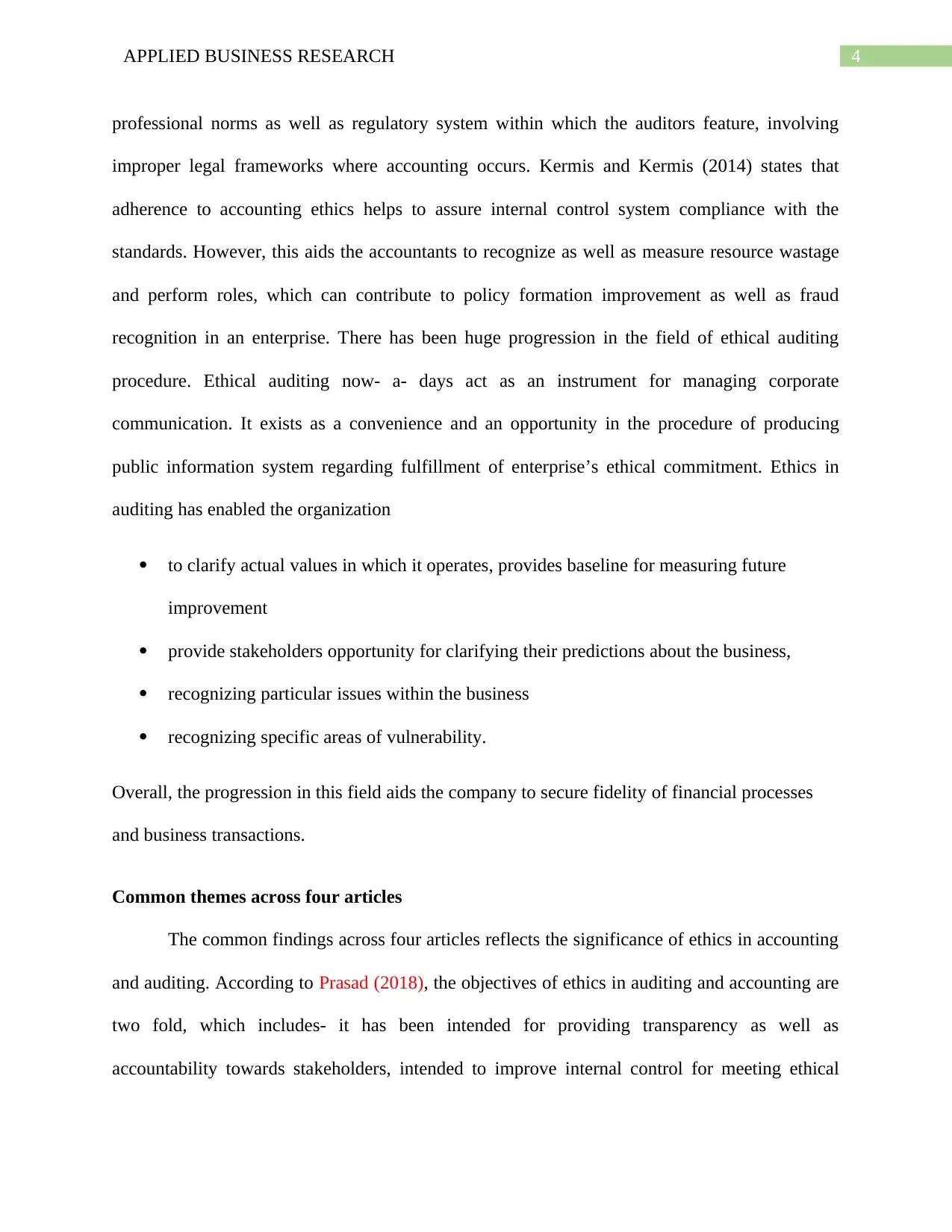
4APPLIED BUSINESS RESEARCH
professional norms as well as regulatory system within which the auditors feature, involving
improper legal frameworks where accounting occurs. Kermis and Kermis (2014) states that
adherence to accounting ethics helps to assure internal control system compliance with the
standards. However, this aids the accountants to recognize as well as measure resource wastage
and perform roles, which can contribute to policy formation improvement as well as fraud
recognition in an enterprise. There has been huge progression in the field of ethical auditing
procedure. Ethical auditing now- a- days act as an instrument for managing corporate
communication. It exists as a convenience and an opportunity in the procedure of producing
public information system regarding fulfillment of enterprise’s ethical commitment. Ethics in
auditing has enabled the organization
to clarify actual values in which it operates, provides baseline for measuring future
improvement
provide stakeholders opportunity for clarifying their predictions about the business,
recognizing particular issues within the business
recognizing specific areas of vulnerability.
Overall, the progression in this field aids the company to secure fidelity of financial processes
and business transactions.
Common themes across four articles
The common findings across four articles reflects the significance of ethics in accounting
and auditing. According to Prasad (2018), the objectives of ethics in auditing and accounting are
two fold, which includes- it has been intended for providing transparency as well as
accountability towards stakeholders, intended to improve internal control for meeting ethical
professional norms as well as regulatory system within which the auditors feature, involving
improper legal frameworks where accounting occurs. Kermis and Kermis (2014) states that
adherence to accounting ethics helps to assure internal control system compliance with the
standards. However, this aids the accountants to recognize as well as measure resource wastage
and perform roles, which can contribute to policy formation improvement as well as fraud
recognition in an enterprise. There has been huge progression in the field of ethical auditing
procedure. Ethical auditing now- a- days act as an instrument for managing corporate
communication. It exists as a convenience and an opportunity in the procedure of producing
public information system regarding fulfillment of enterprise’s ethical commitment. Ethics in
auditing has enabled the organization
to clarify actual values in which it operates, provides baseline for measuring future
improvement
provide stakeholders opportunity for clarifying their predictions about the business,
recognizing particular issues within the business
recognizing specific areas of vulnerability.
Overall, the progression in this field aids the company to secure fidelity of financial processes
and business transactions.
Common themes across four articles
The common findings across four articles reflects the significance of ethics in accounting
and auditing. According to Prasad (2018), the objectives of ethics in auditing and accounting are
two fold, which includes- it has been intended for providing transparency as well as
accountability towards stakeholders, intended to improve internal control for meeting ethical
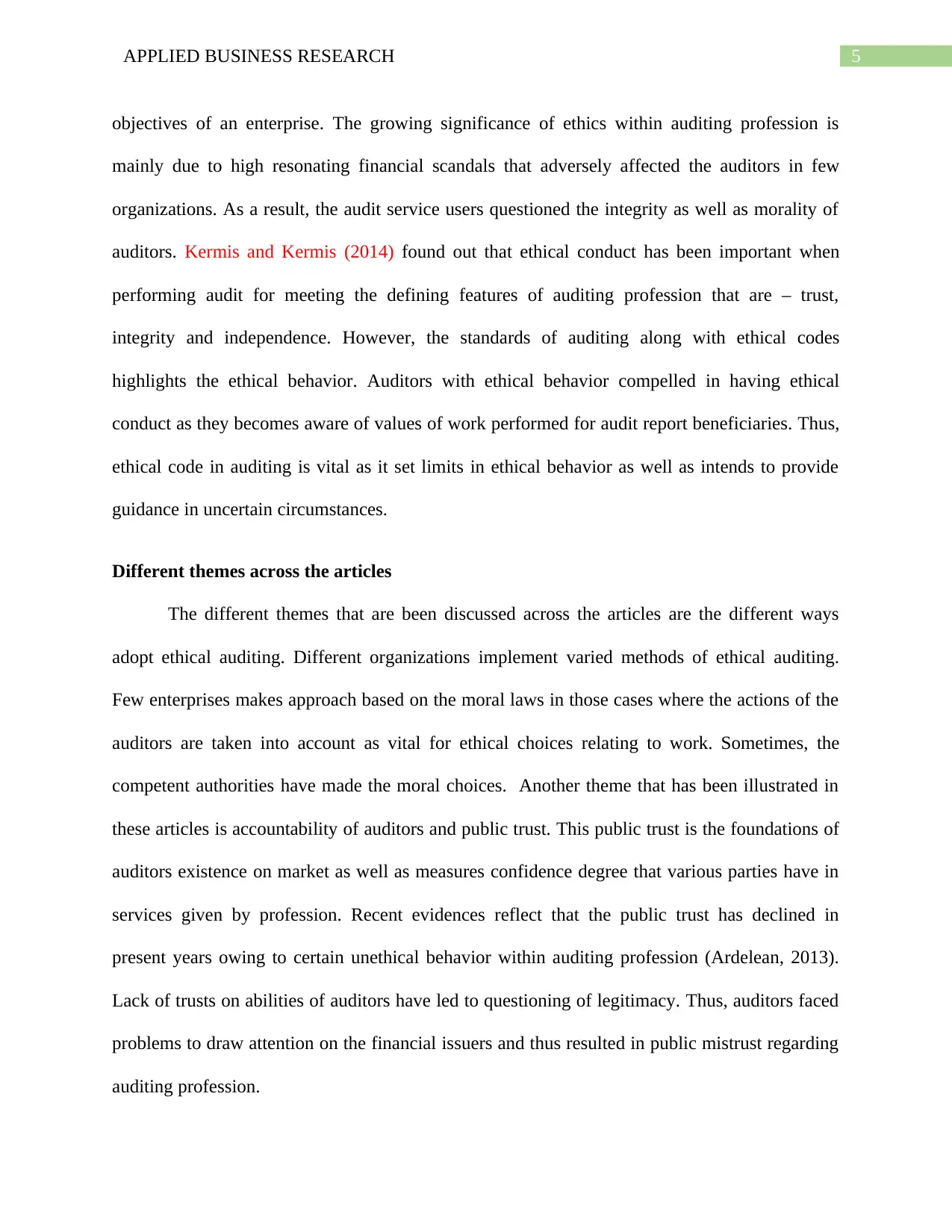
5APPLIED BUSINESS RESEARCH
objectives of an enterprise. The growing significance of ethics within auditing profession is
mainly due to high resonating financial scandals that adversely affected the auditors in few
organizations. As a result, the audit service users questioned the integrity as well as morality of
auditors. Kermis and Kermis (2014) found out that ethical conduct has been important when
performing audit for meeting the defining features of auditing profession that are – trust,
integrity and independence. However, the standards of auditing along with ethical codes
highlights the ethical behavior. Auditors with ethical behavior compelled in having ethical
conduct as they becomes aware of values of work performed for audit report beneficiaries. Thus,
ethical code in auditing is vital as it set limits in ethical behavior as well as intends to provide
guidance in uncertain circumstances.
Different themes across the articles
The different themes that are been discussed across the articles are the different ways
adopt ethical auditing. Different organizations implement varied methods of ethical auditing.
Few enterprises makes approach based on the moral laws in those cases where the actions of the
auditors are taken into account as vital for ethical choices relating to work. Sometimes, the
competent authorities have made the moral choices. Another theme that has been illustrated in
these articles is accountability of auditors and public trust. This public trust is the foundations of
auditors existence on market as well as measures confidence degree that various parties have in
services given by profession. Recent evidences reflect that the public trust has declined in
present years owing to certain unethical behavior within auditing profession (Ardelean, 2013).
Lack of trusts on abilities of auditors have led to questioning of legitimacy. Thus, auditors faced
problems to draw attention on the financial issuers and thus resulted in public mistrust regarding
auditing profession.
objectives of an enterprise. The growing significance of ethics within auditing profession is
mainly due to high resonating financial scandals that adversely affected the auditors in few
organizations. As a result, the audit service users questioned the integrity as well as morality of
auditors. Kermis and Kermis (2014) found out that ethical conduct has been important when
performing audit for meeting the defining features of auditing profession that are – trust,
integrity and independence. However, the standards of auditing along with ethical codes
highlights the ethical behavior. Auditors with ethical behavior compelled in having ethical
conduct as they becomes aware of values of work performed for audit report beneficiaries. Thus,
ethical code in auditing is vital as it set limits in ethical behavior as well as intends to provide
guidance in uncertain circumstances.
Different themes across the articles
The different themes that are been discussed across the articles are the different ways
adopt ethical auditing. Different organizations implement varied methods of ethical auditing.
Few enterprises makes approach based on the moral laws in those cases where the actions of the
auditors are taken into account as vital for ethical choices relating to work. Sometimes, the
competent authorities have made the moral choices. Another theme that has been illustrated in
these articles is accountability of auditors and public trust. This public trust is the foundations of
auditors existence on market as well as measures confidence degree that various parties have in
services given by profession. Recent evidences reflect that the public trust has declined in
present years owing to certain unethical behavior within auditing profession (Ardelean, 2013).
Lack of trusts on abilities of auditors have led to questioning of legitimacy. Thus, auditors faced
problems to draw attention on the financial issuers and thus resulted in public mistrust regarding
auditing profession.
⊘ This is a preview!⊘
Do you want full access?
Subscribe today to unlock all pages.

Trusted by 1+ million students worldwide
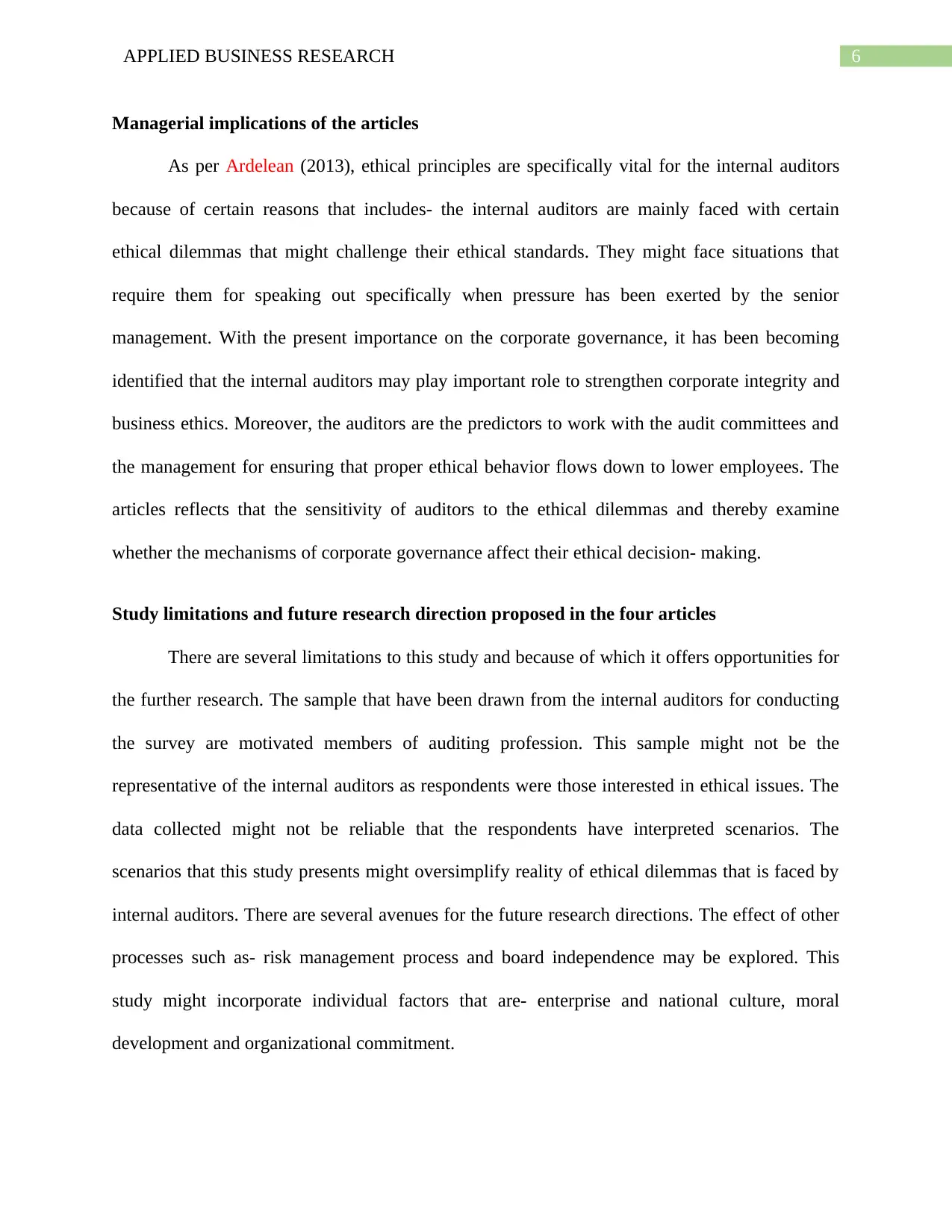
6APPLIED BUSINESS RESEARCH
Managerial implications of the articles
As per Ardelean (2013), ethical principles are specifically vital for the internal auditors
because of certain reasons that includes- the internal auditors are mainly faced with certain
ethical dilemmas that might challenge their ethical standards. They might face situations that
require them for speaking out specifically when pressure has been exerted by the senior
management. With the present importance on the corporate governance, it has been becoming
identified that the internal auditors may play important role to strengthen corporate integrity and
business ethics. Moreover, the auditors are the predictors to work with the audit committees and
the management for ensuring that proper ethical behavior flows down to lower employees. The
articles reflects that the sensitivity of auditors to the ethical dilemmas and thereby examine
whether the mechanisms of corporate governance affect their ethical decision- making.
Study limitations and future research direction proposed in the four articles
There are several limitations to this study and because of which it offers opportunities for
the further research. The sample that have been drawn from the internal auditors for conducting
the survey are motivated members of auditing profession. This sample might not be the
representative of the internal auditors as respondents were those interested in ethical issues. The
data collected might not be reliable that the respondents have interpreted scenarios. The
scenarios that this study presents might oversimplify reality of ethical dilemmas that is faced by
internal auditors. There are several avenues for the future research directions. The effect of other
processes such as- risk management process and board independence may be explored. This
study might incorporate individual factors that are- enterprise and national culture, moral
development and organizational commitment.
Managerial implications of the articles
As per Ardelean (2013), ethical principles are specifically vital for the internal auditors
because of certain reasons that includes- the internal auditors are mainly faced with certain
ethical dilemmas that might challenge their ethical standards. They might face situations that
require them for speaking out specifically when pressure has been exerted by the senior
management. With the present importance on the corporate governance, it has been becoming
identified that the internal auditors may play important role to strengthen corporate integrity and
business ethics. Moreover, the auditors are the predictors to work with the audit committees and
the management for ensuring that proper ethical behavior flows down to lower employees. The
articles reflects that the sensitivity of auditors to the ethical dilemmas and thereby examine
whether the mechanisms of corporate governance affect their ethical decision- making.
Study limitations and future research direction proposed in the four articles
There are several limitations to this study and because of which it offers opportunities for
the further research. The sample that have been drawn from the internal auditors for conducting
the survey are motivated members of auditing profession. This sample might not be the
representative of the internal auditors as respondents were those interested in ethical issues. The
data collected might not be reliable that the respondents have interpreted scenarios. The
scenarios that this study presents might oversimplify reality of ethical dilemmas that is faced by
internal auditors. There are several avenues for the future research directions. The effect of other
processes such as- risk management process and board independence may be explored. This
study might incorporate individual factors that are- enterprise and national culture, moral
development and organizational commitment.
Paraphrase This Document
Need a fresh take? Get an instant paraphrase of this document with our AI Paraphraser
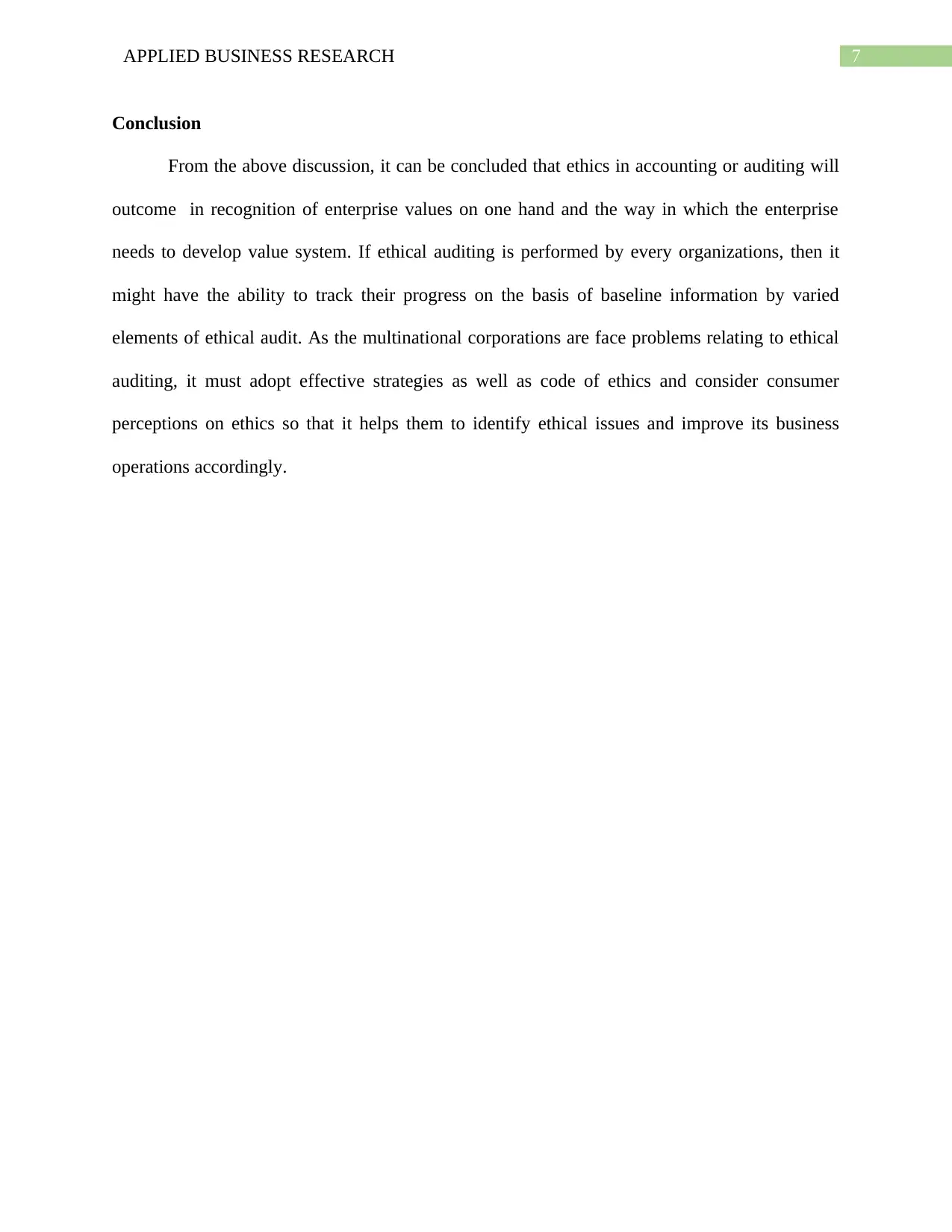
7APPLIED BUSINESS RESEARCH
Conclusion
From the above discussion, it can be concluded that ethics in accounting or auditing will
outcome in recognition of enterprise values on one hand and the way in which the enterprise
needs to develop value system. If ethical auditing is performed by every organizations, then it
might have the ability to track their progress on the basis of baseline information by varied
elements of ethical audit. As the multinational corporations are face problems relating to ethical
auditing, it must adopt effective strategies as well as code of ethics and consider consumer
perceptions on ethics so that it helps them to identify ethical issues and improve its business
operations accordingly.
Conclusion
From the above discussion, it can be concluded that ethics in accounting or auditing will
outcome in recognition of enterprise values on one hand and the way in which the enterprise
needs to develop value system. If ethical auditing is performed by every organizations, then it
might have the ability to track their progress on the basis of baseline information by varied
elements of ethical audit. As the multinational corporations are face problems relating to ethical
auditing, it must adopt effective strategies as well as code of ethics and consider consumer
perceptions on ethics so that it helps them to identify ethical issues and improve its business
operations accordingly.
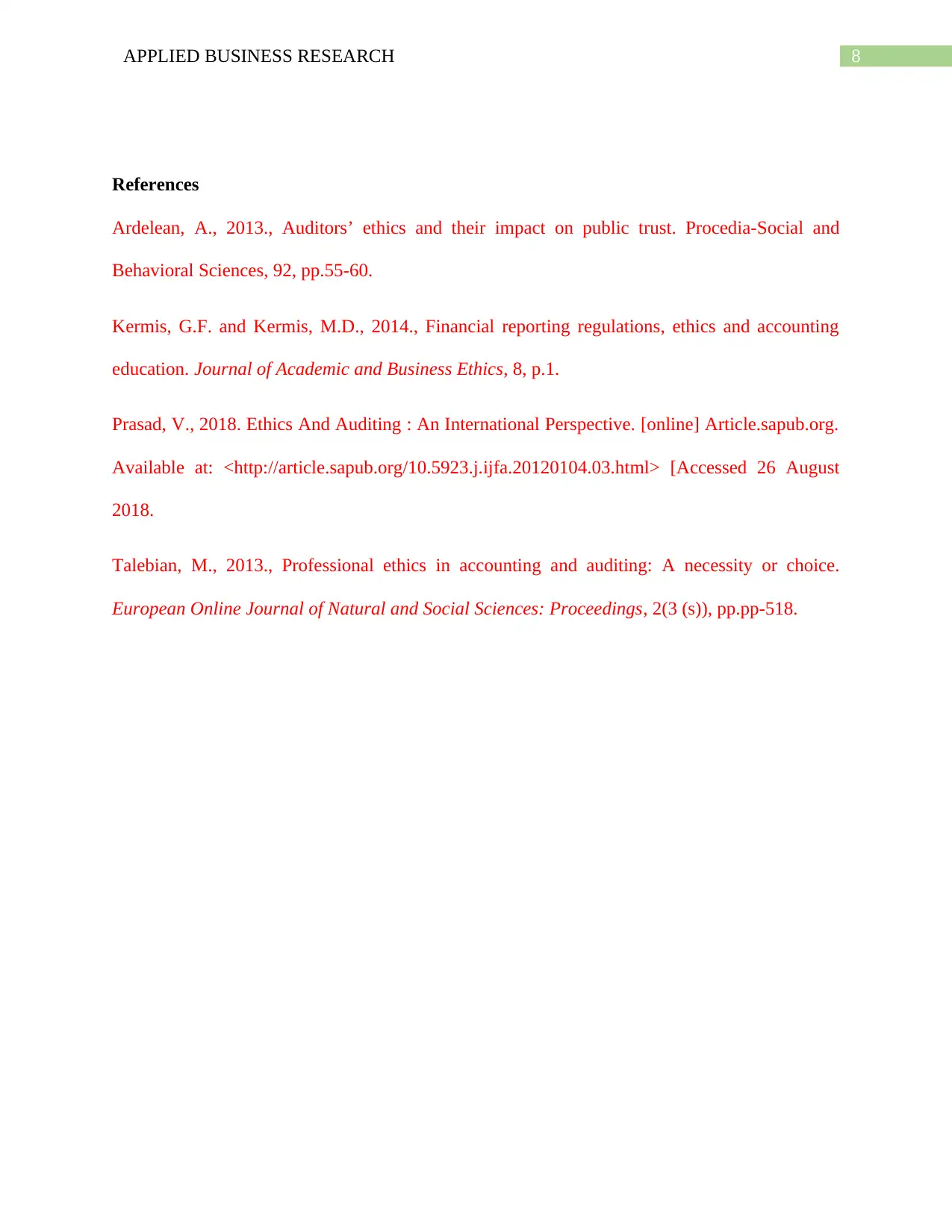
8APPLIED BUSINESS RESEARCH
References
Ardelean, A., 2013., Auditors’ ethics and their impact on public trust. Procedia-Social and
Behavioral Sciences, 92, pp.55-60.
Kermis, G.F. and Kermis, M.D., 2014., Financial reporting regulations, ethics and accounting
education. Journal of Academic and Business Ethics, 8, p.1.
Prasad, V., 2018. Ethics And Auditing : An International Perspective. [online] Article.sapub.org.
Available at: <http://article.sapub.org/10.5923.j.ijfa.20120104.03.html> [Accessed 26 August
2018.
Talebian, M., 2013., Professional ethics in accounting and auditing: A necessity or choice.
European Online Journal of Natural and Social Sciences: Proceedings, 2(3 (s)), pp.pp-518.
References
Ardelean, A., 2013., Auditors’ ethics and their impact on public trust. Procedia-Social and
Behavioral Sciences, 92, pp.55-60.
Kermis, G.F. and Kermis, M.D., 2014., Financial reporting regulations, ethics and accounting
education. Journal of Academic and Business Ethics, 8, p.1.
Prasad, V., 2018. Ethics And Auditing : An International Perspective. [online] Article.sapub.org.
Available at: <http://article.sapub.org/10.5923.j.ijfa.20120104.03.html> [Accessed 26 August
2018.
Talebian, M., 2013., Professional ethics in accounting and auditing: A necessity or choice.
European Online Journal of Natural and Social Sciences: Proceedings, 2(3 (s)), pp.pp-518.
⊘ This is a preview!⊘
Do you want full access?
Subscribe today to unlock all pages.

Trusted by 1+ million students worldwide
1 out of 9
Related Documents
Your All-in-One AI-Powered Toolkit for Academic Success.
+13062052269
info@desklib.com
Available 24*7 on WhatsApp / Email
![[object Object]](/_next/static/media/star-bottom.7253800d.svg)
Unlock your academic potential
Copyright © 2020–2026 A2Z Services. All Rights Reserved. Developed and managed by ZUCOL.





